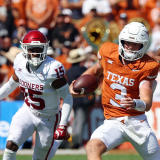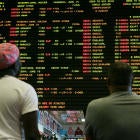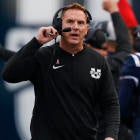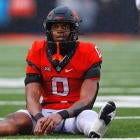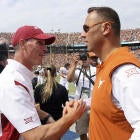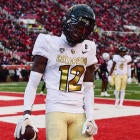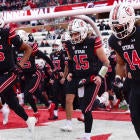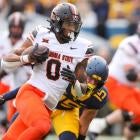The NCAA has turned the College World Series into a craft brew festival. It has lessened the penalties for marijuana use. The association has booked the likes of Bruce Springsteen, The Chainsmokers and Kings of Leon for its Final Four concerts.
Just when it seemed like the NCAA had become millennial hipsters, amateur sports' Big Brother went old school. It drew the line at gambling. Actually, the line was already drawn.
The NCAA Board of Governors on Wednesday reaffirmed its stance on sports wagering.
- No legal or illegal gambling on professional or college events (including fantasy leagues, office pools, brackets, etc.).
- No national injury reports.
This after sources had been telling CBS Sports for months that the NCAA's walls surrounding gambling were about to come tumbling down.
It seemed logical. The NCAA had reflected society's mood recently joining the party when it came to alcohol, marijuana and gambling.
The NCAA had assembled an ad hoc committee on sports wagering, sticking a finger in the air to see which way the wind was blowing. The football season will kick off with at least nine states sponsoring sports gambling. Alcohol can now be served at championship events after a successful pilot program started at the College World Series.
The charge for that ad hoc committee was determine whether the membership had the stomach for more liberalized gambling rules for athletes. In essence, did the NCAA really want to suspend a senior of legal age making a $5 bet on the Packers?
The answer came back Wednesday. It was a resounding, "Yes."
That status quo continues at the NCAA's peril.
The association's stance may change someday. We can even cite the reason. All it will take is some sort of point-shaving scandal for everyone to see the light.
"[The NCAA has] got to do something. They leave themselves open to corruption," said Tom McMillen, president of Lead1 Association, last year. Lead1 represents and supports FBS athletic directors.
The NCAA even consults with a known former crime boss who can tell just by watching which games aren't square. He should know. Michael Franzese fixed enough of them.
CBS Sports reported in May that there was enough information for that working group to propose a national injury report.
It never happened. The ad hoc committee talked to schools and gaming officials. It ultimately found there was no desire. The NCAA membership -- the schools themselves -- was dead set against it.
Whether that will come back and bite them remains to be seen. Injury reports have been a foundational part of the NFL culture as soon as they were mandated in the 1940s. Since that same decade, college athletics have averaged at least one major point-fixing scandal every 10 years.
Those NFL injury reports also legitimized the games themselves. With so much legal and illegal gambling going on, there had to be some information that could be trusted.
The time, it seemed, had come to require college to issue at least weekly injury report. If not, the NCAA was asking for corruption. The Big Ten last year asked the NCAA to consider developing a national football player availability report. Ohio State athletic director Gene Smith advocated a "modified version" of the weekly NFL injury report (designations of "probable," "doubtful" or "out.")
Common sense tells you the NFL is more insulated against a point-fixing scandal. Its players are highly paid with little reason to take a bag of money to keep the spread under two touchdowns.
Plus, there are only 32 teams of which to keep track. The NCAA has 1,100 members. Both the Pac-12 and SEC are conducting comprehensive officiating reviews, at least in part because of the changed gambling culture.
It only takes one coach not cooperating to issue an injury report to bring the whole thing down. The NCAA basically acknowledged that reality Wednesday, gambling it could protect the integrity of the game while playing Russian Roulette with a fully loaded scandal.
"Truth be told, I can see both sides," said Todd Fuhrman, a gaming analyst for SportsLine, an affiliate of CBS Sports. "A transparent injury report alleviates any concern of inside knowledge. But the only league right now at the pro level where things are shared is the NFL."
The other side?
"When it comes to protecting the 18-year-old athlete, it could be OK to keep quiet [on injury information], but they better educate players on the dangers of sharing information publicly," Fuhrman said.
It just makes sense that college injury information is harder to keep secret than professional information. That's why oddsmakers scour the social media accounts of athletes to help set lines.
Why not legitimize the games in the new gambling culture? One guess: Watch some wacky point spread fluctuations this first season of legal single-game sports gambling.
Nobody said any of this was easy. But the pain of another Boston College or Toledo has to be greater than arguing over whether Trevor Lawrence is probable or not.
No, you say?
Wanna bet?


